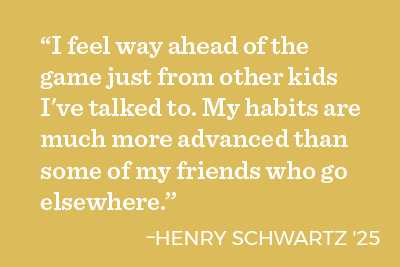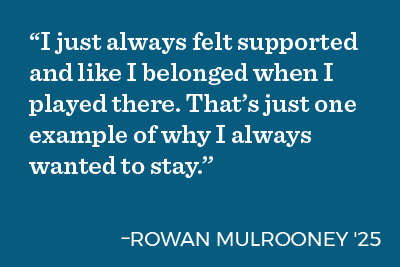May 22, 2025
 Approaching the end of their final year roaming the halls of MPA as students, we had the honor of interviewing many of the MPA Class of 2025 Lifers about their experiences at MPA, the only school they’ve attended for their entire academic careers.
Approaching the end of their final year roaming the halls of MPA as students, we had the honor of interviewing many of the MPA Class of 2025 Lifers about their experiences at MPA, the only school they’ve attended for their entire academic careers.
All incredibly talented students with well-versed backgrounds in the arts, athletics, and academics shared memories and reflections of MPA past and present, looking toward the future well prepared by MPA. Ari Williams, Henry Schwartz, Camdyn Magnuson, Quentin Hawley, Navreen Biring, Lucia Braith, and Rowan Mulrooney are all set to graduate on May 31, joining the Joanne Olson Club, reserved for students whose entire K-12 or PreK-12 journey has taken place here at MPA.
Choosing a school for 13 years means becoming part of a close-knit community where every child is truly seen and supported. So we asked: How has MPA’s community supported and shaped you as a student, a human being, and a young person?
Henry: The teachers get to know you really well. Recently, Ms. Murr in class made a recommendation for a book that I might like based on how she knows me. I know you wouldn’t get that anywhere else. It’s really cool. It teaches you how to ask questions because the teachers have that kind of connection with you, and it’s not scary to go up to them, even if it’s your first year having this teacher.
Rowan: My entire identity has been shaped by Mounds Park Academy, but especially when referring to the college application process, I would not nearly have been able to do what I did without the help of Dr. Quam. Especially hearing from other schools, their systems that they have set up for college health are not nearly the same. Especially with teachers, it’s very one-on-one and very helpful.
Camdyn: I talked about this in my senior speech when I talked about my journey with my own social anxiety, and I feel like, through the years working through that, I’ve just gotten a lot of support from my classmates, and some of the teachers have made accommodations or know how I am with that stuff and know what my limits are in certain assignments that are like that. I’m really appreciative of that.
Lucia: My classmates know each other really, really well. Because we’re all just really close, and we can be ourselves all the time.
Navreen: I always speak about my time in volleyball, especially my ninth-grade year, when we went to state. The biggest moment for me was looking back and looking into the seats at the Xcel Energy Center and realizing everyone came for just this one team, and that there’s such a big community, but everyone supports each other.
College preparation is essential, but when we think about preparation at MPA, we know that preparation for life is more important. Talk a little about how you feel MPA has prepared you, not just academically, but socially, emotionally, and for life.
 Henry: I feel way ahead of the game just from other kids I’ve talked to. My habits are much more advanced than some of my friends who go elsewhere. I love how well this place prepares us. It’s a supportive environment, so taking the risks is less scary, which will come in handy if you’re speaking up at a big meeting or just applying for a job that you don’t know if you’re going to get, just being able to jump into that with an open mind.
Henry: I feel way ahead of the game just from other kids I’ve talked to. My habits are much more advanced than some of my friends who go elsewhere. I love how well this place prepares us. It’s a supportive environment, so taking the risks is less scary, which will come in handy if you’re speaking up at a big meeting or just applying for a job that you don’t know if you’re going to get, just being able to jump into that with an open mind.
Rowan: Academically, with the smaller class size, it becomes a lot easier to take risks as well because we’re getting to know those around you, as well as within sports. With the no-cut policy, it also allows for more development and developing your abilities, and not being as scared about making the team and trying out in that sense. Then, also, socially, I think it can force you to make resolutions and solve the issues around you. I think that MPA teaches you how to learn, and what I’ve heard the majority of other students say is that sometimes the workload has been easier in college than what they’ve experienced at MPA. The structure and constantly trying to balance your social life, your extracurriculars, and academics at the same time, prepares you a lot for any future, even a potential job and schooling in college, balancing all that.
Camdyn: The way we all interact with each other, especially in a community, forces us to understand what we are saying and speak in a way that we should for the rest of our lives. Some of the requirements that we have to meet, especially this year, I feel like, are super important. Our senior service projects, even getting us in that world, or even our senior speeches, are really important in giving us a choice of what or who we would deliver them to. The way that everything has been structured and the way that teachers have said that colleges can be compared to MPA. My college decision made me less scared to choose a college that might be harder, because we had that at MPA.
Lucia: I feel like we’ve been taught how to have really good, complex conversations and ask good questions, and I feel like that’s going to really benefit us in the future. I feel like we can have more mature conversations rather than listening to other people’s opinions and stuff like that rather than, “This is my idea, I’m sticking to it.” We go in larger groups and present, and I feel like I’m a lot more used to that, where it’s maybe public school, where the classes are much bigger, that’s not going to happen, or you don’t get as much help. I feel like the senior service project, that’s taught me a lot, because I’ve pushed it to the wind and I’m really cutting close. I’ve been really indecisive, and I don’t like to do stuff right away, but I feel like, over the years of being here, I’ve really gotten better, especially this year, and I feel like I’m a lot more ready to move on with my life and go forward.
Navreen: For academic success, we can just get through so much material. The classes are so small, it’s really easy to speak up. I feel very prepared to go to college, especially writing-wise, which is what I’ve heard from my brother and others. English classes are pretty easy; writing essays is the independent side of English. Professionally, I feel as prepared as I can be. Obviously, I don’t really know completely what I want to do yet. I want to go into the medical field, but I don’t have a really specific area yet. MPA has definitely helped me explore the sciences as well as English and a bunch of other areas.
At MPA, every child’s experience is uniquely their own—thanks to a strong commitment to differentiation and individualized attention from PreK-12. To help Lifers reflect on and share their personal journeys, we asked: Why did you stay at MPA through 12th grade? Looking back, how do you feel about that decision? What was that journey like?
Henry: I never really hesitated. My parents always asked me, almost as a joke, but just to hear an actual word. They were like, “Still want to stay?” And I always said, yeah. Then, especially when the pandemic hit, I did not question, “I’m absolutely going to stay here,” because of how much better I knew that we were able to adapt, so I never questioned it. I’m really glad. I think that, even though it’s really small, you get really personal connections and it teaches you how to get really close with a small group of people rather than have many, many acquaintances, which I think is really important for the future.
A take that I’ve gathered, is that in Lower School, you really learn how to be a respectful kid and get the fundamentals of learning, and then Middle School, it’s a similar experience throughout no matter where you are, and then Upper School, you come back and you get the rigor again, but now you can have the experience of what it’s like to be a little more social.
Rowan: From the beginning, for most of us, we could probably say that it wasn’t necessarily our choice at the beginning, but my mom always recounts the story of why she chose MPA, and initially, with just how supportive the community was when she first visited. For me, there are always moments of questioning what’s around me in general, but I always knew that my identity was so entrenched in the school itself, and especially with tennis. That was a huge driving factor. I just always felt supported and like I belonged when I played there. That’s just one example of why I always wanted to stay.
Camdyn: An important reason why I stayed and why MPA is important to me is that every time I see my family, they always talk about how special it is to be here and how lucky we all are to get the type of education we are, especially with all of my family growing up here and going to all the public schools around. Even though it’s probably been changed a bit, they’re just saying that MPA has given us so many opportunities that will put us in a good position for the future.
Lucia: I like being a lifer—people joke about it because I’ve been here for so long—and it’s not normal to stay somewhere that long. I don’t know, but I do like it, it’s cool.
MPA values collaboration over competition, which manifests in academics, athletics, and interpersonal relationships. Having a collaborative environment allows exploration without consequences. So we asked: How have you thrived in MPA’s environment of collaboration over competition?
Henry: The art history project from American Studies last year was a level of collaboration I’ve never done before, where you and three other kids really dig into a time and a place and a piece or a group of pieces and just like… It’s a big project and you have a lot of time to do it, so having to collaborate on, “All right, we’re going to get together and do this, and we’re going to work this out.” That was definitely very collaborative and very important, because I know that collaboration is a huge part of the real world, and learning how to do that at this age is extremely important. I know that it’s one of the biggest problems, because people don’t know how to work with each other.
 Rowan: I think collaboration happens every day at MPA. I think something that me and some of the other classmates were discussing just yesterday was how, at other schools, they might often just be handed the traditional packet just to fill it out, but our school is so incredibly hands-on, and I’m very grateful for that.
Rowan: I think collaboration happens every day at MPA. I think something that me and some of the other classmates were discussing just yesterday was how, at other schools, they might often just be handed the traditional packet just to fill it out, but our school is so incredibly hands-on, and I’m very grateful for that.
We are so excited to see how the Class of 2025 changes the world and how their experiences at MPA will support them on their next adventures. To end, we asked: In one word, what does it mean to you to be an MPA Lifer?
Henry: Community.
Camdyn: Bright.
Lucia: Home.
Navreen: Dream.
Rowan: Dynamic.
Interested in where the Class of 2025 Lifers are headed next year?
- Ari Williams will be studying Jazz Studies and Contemporary Music at The New School
- Henry Schwartz will be studying Environmental Engineering at the Montana State University Honors College
- Camdyn Magnuson will be studying Psychology at Boston University
- Quentin Hawley will be studying Biology at Luther College
- Navreen Biring will be studying Psychobiology at the University of California, Los Angeles
- Lucia Braith will be attending St. Cloud State University
- Rowan Mulrooney will be studying English at the University of California, Berkeley